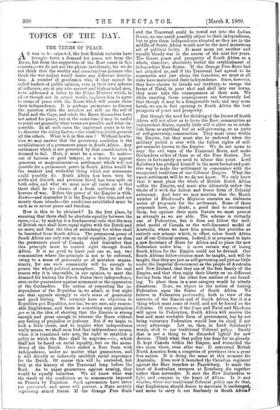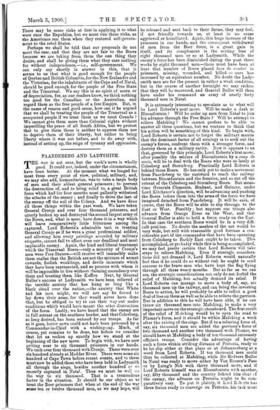TOPICS OF THE DAY.
THE TERMS OF PEACE.
AS was to b expected, the first British victories have brought forth a demand for peace, not from the Boers, but from the supporters of the Boer cause in this country,—we do not use the phrase invidiously, for we do not think that the worthy and conscientious persons who think the war unjust would desire any different descrip- tion. A number of gentlemen who, if they cannot be called leaders of public opinion, even in their own spheres of influence, are at any rate earnest and high-minded men, have addressed a letter to the Prime Minister which, in effect though not in actual words, implores him to agree to terms of peace with the Boers which will secure them their independence. It is perhaps premature to discuss the question while the invaders are still on the soil of Natal and the Cape, and while the Boers themselves have not asked for peace, but at the same time it may be useful to point out generally what terms are possible and what im- possible. In all such cases the important point is to try to discover the ruling factor,—the condition which governs all the others. What is it in this case ? Without hesita- tion we may answer that the governing condition is the establishment of a permanent peace in South Africa. Any settlement which is not governed by that consideration is doomed to fail. More, it must be a crime. To make— out of laziness or good temper, or a desire to appear generous or magnanimous—a settlement which will not provide for a permanent peace in South Africa would be the weakest and . wickedest thing which our statesmen Gallia possibly do. South Africa has been torn by strife and discord, and precious blood has been spilt on both sides, and what we must now all insist on is that there shall be no chance of a fresh outbreak of the horrors of war. Before the power of the Empire is with- drawn—and remember it is the Empire this time, and not merely these islands—the conditions established must be such all to secure peace and freedom.
How is this to be obtained ? In the first place, by ensuring.that there shall be absolute equality between the races,—i.e., by making it a fundamental rule that the man of British race shall have equal rights with the Dutch and no more, and that the idea of ascendency for either shall be banished from South Africa. The permanent peace of South Africa can only rest on racial equality, just as does the permanent peace of Canada. And remember that this principle must be carried right through South Africa. It is no good to leave just one or, say, two communities where the principle is not to be enforced, awing to a sense of generosity or of mistaken magna- lability, for one such community will be enough to poison the whole political atmosphere. This is the real reason-why it is impossible, in our opinion, to meet the demand for leaving the Dutch States their independence, even under guarantees against armament or the oppression of the Outlanders. The notion of respecting the in- dependence of the Republics is, we admit, at first sight one that appeals strongly to one's sense of generosity and good feeling. We certainly have no objection to Republics quit Republics, nor has, we are sure, any reason- able Englishman, and there is something very attractive per se in the idea of showing that the Empire is strong enough and great enough to tolerate the Boers without any feeling of prejudice or jealousy. But if we begin to look a little closer, and to inquire what independence really means, we shall soon find that independence means, when it is translated into acts, the right to establish a polity in which the Boer shall be supreme,—i.e., which shall not be based on racial equality, but on the even- dency of the Dutch. Once endow a Boer State with independence, under no matter what guarantees, and it will directly or indirectly establish racial supremacy for the Dutch. Of course this will be contested, but look at the history of the Transvaal long before the Raid. As to paper guarantees against arming, they would be equally valueless. We all know what was the result of the conditions as to armaments imposed on Prussia by Napoleon. Such agreements have never yet prevented, and never will prevent, a State secretly Jrgauising armed forces. If the Orange Free State and the Transvaal could be towed out into the Indian Ocean, no one could possibly object to their independence, but to give them independence situated as they are in the middle of South Africa would now be the most monstrous act of political levity. It must mean yet another and equally bloody war in the course of the next few years. The future peace and prosperity of South Africa as a whole, therefore, absolutely forbid the establishment of independent Boer States. If the Orange Free State had not attacked us, and if the Transvaal had agreed to be reasonable and just about the franchise, we must at all risks have maintained their independence. Since, however, they have chosen to invade our territory, to ravage the farms of Natal, to pour shot and shell into our towns, they must take the consequences of their acts. We while exacting those consequences can fortunately feel that though it may be a disagreeable task, and. may seem harsh, we are in fact opening to South Africa the best prospects of paace and prosperity.
But though the need for thinking of the future of South Africa will not allow us to leave the Boer communities as independent States, equally little will it allow us to estab- lish them as anything but as self-governing, or as parts of self-governing, communities. They must come within the Empire, but they must also be endowed when the military period is over with the fullest rights of self- gov ernment known to the Empire. We do not mean to copy the evil ways of the Transvaal Boers, and make Outlanders either of them or of the Free Sta.ters. But there is fortunately no need to labour this point. Lord Salisbury has pledged himself in the most formal and posi- tive way to make the settlement in consonance with the recognised traditions of our Colonial Empire. What the exact settlement will be we do not know. We only know that it must place the whole of British South Africa within the Empire, and must also ultimately endow, the whole of it with the fullest and freest form of Colonial . autonomy. And here we may mention that the March • . number of Blackwood's Magazine contains an elaborate series of proposals for the settlement, Spree of these proposals have, no doubt, a good deal to recommend them, but against their main feature we must pretest as strongly as we are able. The scheme is virtually one of Federation, but it does not follow the Well- tried model of Canada or the well-discussed model of Australia, where we have firm ground, but provides an entirely new scheme which, in effect, takes South Africa out of our Colonial system. Indeed, it is proposed to have . a new Secretary of State for Africa and to place the new Federation under him. A more certain way of losing South Africa for the Empire could not be devised. Our South African fellow-citizens must be taught, and will be taught, that they are just as self-governing and just as little under the Imperial Government as the people of Australia and New Zealand, that they are of the free family of the Empire, and that they enjoy their liberty on no different footing from that of the other free nations of our found- ing. To place them in a new category would be ntterly disastrous. Next, we object to the notion of forcing Federation upon. the States of South Africa. We believe in Federation profoundly, both in view of the interests of the Empire and. of South Africa, but it is a thing which must come of itself, and not be forced on the Colonies. Of course, if the Cape and Natal and Rhodesia, - . will agree to .Federation, South Africa will receive the best and most, workable form of government, but by not being voluntary Federation would lose its chief, if not every advantage. Let us, then, in Lord. Salisbury's words, stick to our traditional Colonial policy. Surely that is not a thing to be discarded lightly' for• new - devices. Think what that policy has done for us already. It kept Canada within the Empire, and reconciled the two races there, even after war. It converted British North America from a congeries of provinces into a great free nation. It is doing the same at this moment .for Australia. Even now it launched the Canadian regiment against the Boer trenches at Paardeberk. It made the knot of Australian troopers at Rensburg die together rather than surrender. It sent the New Zealanders to fight and conquer in the heart of Africa. Is it any wonder, when our traditional Colonial policy can do that that Englishmen should desire to maintain it unchanged,. . and mean to carry it out fearlessly in So'uth Africa? There may be some risks at first in applying it to what were once the Republics, but we must run those risks, as the Americans ran them when they restored self-govern- ment to the rebel States.
Perhaps we shall be told that our proposals do not meet the case, and that they are not fair to the Boers because we are taking from them ' the one thing they desire, and shall be giving them what they care nothing for without independence, —i.e., self-government. We can only say shortly in answer to this, that it seems to us' that what is good enough for the people of Quebec and British Columbia, for the New Zealander and the Victorian, for the inhabitants of the Cape and of Natal, should be good enough for the people of the Free State and the Transvaal. We say this in no spirit of scorn or of depreciation, for, as our readers know, we think nothing too good for the Canadian or the Australian, and regard them as the free people of a free Empire. But, in the name of reason and good sense, how can it be argued that we shall be treating the people of the Transvaal as a conquered people if we treat them as we treat Canada ? We cannot give them more than Colonial rights without imperilling the peace of all South Africa, but we protest that to give them those is neither to oppress them nor to deprive them of their liberty, but rather to bring liberty where it was not before, and to do away with, instead of setting up, the reign of tyranny and oppression.







































 Previous page
Previous page